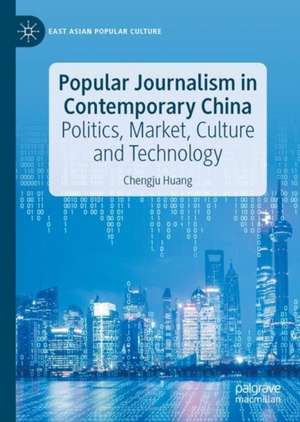Popular Journalism in Contemporary China: Politics, Market, Culture and Technology: East Asian Popular Culture
Autor Chengju Huangen Limba Engleză Hardback – 23 sep 2023
Din seria East Asian Popular Culture
- 9%
 Preț: 814.98 lei
Preț: 814.98 lei -
 Preț: 345.89 lei
Preț: 345.89 lei - 18%
 Preț: 888.97 lei
Preț: 888.97 lei - 18%
 Preț: 781.31 lei
Preț: 781.31 lei - 18%
 Preț: 784.79 lei
Preț: 784.79 lei - 18%
 Preț: 731.41 lei
Preț: 731.41 lei - 15%
 Preț: 585.08 lei
Preț: 585.08 lei - 15%
 Preț: 645.47 lei
Preț: 645.47 lei - 15%
 Preț: 707.46 lei
Preț: 707.46 lei - 15%
 Preț: 505.30 lei
Preț: 505.30 lei - 15%
 Preț: 587.72 lei
Preț: 587.72 lei - 18%
 Preț: 795.36 lei
Preț: 795.36 lei - 15%
 Preț: 583.45 lei
Preț: 583.45 lei - 15%
 Preț: 520.61 lei
Preț: 520.61 lei - 15%
 Preț: 581.14 lei
Preț: 581.14 lei - 15%
 Preț: 582.80 lei
Preț: 582.80 lei - 15%
 Preț: 579.34 lei
Preț: 579.34 lei -
 Preț: 378.54 lei
Preț: 378.54 lei - 9%
 Preț: 740.90 lei
Preț: 740.90 lei -
 Preț: 378.54 lei
Preț: 378.54 lei - 15%
 Preț: 691.91 lei
Preț: 691.91 lei - 15%
 Preț: 641.38 lei
Preț: 641.38 lei - 18%
 Preț: 776.88 lei
Preț: 776.88 lei - 8%
 Preț: 578.16 lei
Preț: 578.16 lei - 18%
 Preț: 728.91 lei
Preț: 728.91 lei - 15%
 Preț: 695.34 lei
Preț: 695.34 lei - 18%
 Preț: 726.69 lei
Preț: 726.69 lei
Preț: 726.06 lei
Preț vechi: 885.44 lei
-18% Nou
Puncte Express: 1089
Preț estimativ în valută:
138.98€ • 151.01$ • 116.81£
138.98€ • 151.01$ • 116.81£
Carte tipărită la comandă
Livrare economică 21 aprilie-05 mai
Preluare comenzi: 021 569.72.76
Specificații
ISBN-13: 9783031405297
ISBN-10: 3031405293
Ilustrații: XV, 191 p.
Dimensiuni: 148 x 210 mm
Greutate: 0.4 kg
Ediția:1st ed. 2023
Editura: Springer International Publishing
Colecția Palgrave Macmillan
Seria East Asian Popular Culture
Locul publicării:Cham, Switzerland
ISBN-10: 3031405293
Ilustrații: XV, 191 p.
Dimensiuni: 148 x 210 mm
Greutate: 0.4 kg
Ediția:1st ed. 2023
Editura: Springer International Publishing
Colecția Palgrave Macmillan
Seria East Asian Popular Culture
Locul publicării:Cham, Switzerland
Cuprins
1: Introduction: Understanding popular journalism in China.- 2: Mao’s war on popular journalism (1950s-1970s).- 3: The day starts at 3.00pm: Evening newspapers and soft journalism (1980s).- 4: The tabloid decades: The rise and reign of popular journalism (1990s-2000s).- 5: The struggle for a popular critical journalism under one-Party rule.- 6: The power and limits of nationalistic popular journalism.- 7: The paradox of popularity: Popular Citizen journalism in the era of new/social media.- 8: Propaganda advances, popular journalism retreats (since the 2010s).- 9: The uncertain future: Popular journalism and China dream.
Notă biografică
Chengju Huang (PhD) is senior lecturer in the School of Media and Communication, RMIT University, Australia. His research interests include Asian/Chinese media studies, international communication, and comparative media systems. Among other publications, his work has appeared in top international journals such as Journal of Communication, Journalism Studies, Journalism: Theory, Practice and Criticism, and The International Communication Gazette.
Textul de pe ultima copertă
This book, the first of its kind, investigates the historical trajectory and current situation of popular journalism in the People's Republic of China. Taking a popular cultural perspective, the book redefines “popular journalism” as a particular journalistic genre and media form and applies it to conceptualize popular journalism in the Chinese context. In particular, it examines how the dynamic and complex interplay of politics, the market, culture, and communication technology in shifting contexts has shaped the changing landscape of popular journalism in contemporary China. Meanwhile, regardless of how these factors might have changed over time, the fundamental nature of popular journalism as a source of fun and a troublemaker against elite powers in China, as in other places, has remained. The book further argues that the historical development of popular journalism in China forms an important and integral part of the country's social-cultural fabric and ultimately illustrates the mediated ideological and cultural struggle between popular/public and elite/state discourses in the country’s everyday social life in its challenging and discursive transition to modernity.
Caracteristici
Investigates the historical trajectory and current situation of popular journalism in post-Mao China Argues that popular journalism in post-Mao China not merely entertains the Chinese masses Argues that popular journalism in post-Mao China forms as an important and integral part of China’s social-cultural fabric
